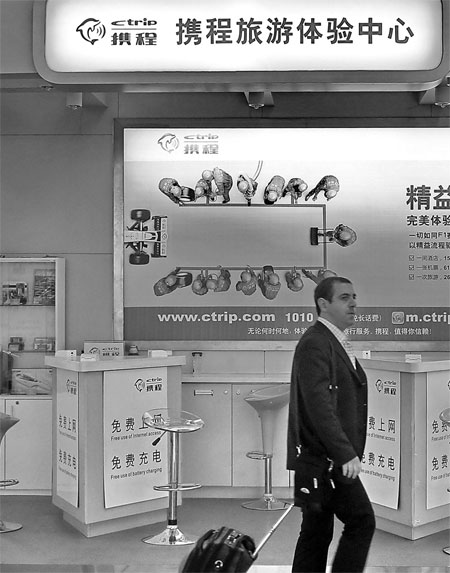Price war cuts Ctrip.com's income by 39 percent
|
The Ctrip Travel Experience Center at Tianhe Airport in Wuhan, Hubei province. Provided to China Daily |

Leading online travel agency hit by competition, rises in expenses
Income at Ctrip.com International Ltd, the largest Chinese online travel agency by market share, continued to fall in 2012.
The agency's operational income was 655 million yuan ($105 million) last year, down 39 percent from 2011, while its net revenue was 4.2 billion yuan, up 19 percent year-on-year, according to the company's annual results released on Friday.
Ctrip.com's income has declined since the third quarter of 2011, although its net revenue has maintained double-digit growth.
The low income has been put down to stiffer competition among Chinese online travel agencies and Ctrip.com's growing expenses for sales and marketing in 2012.
Fan Min, its CEO, described 2012 as a "year of investment".
The agency spent 984 million yuan on sales and marketing last year, a year-on-year rise of 58 percent, as China's online travel agencies started a price war in the summer.
Mangocity.com, a subsidiary of China Travel Service (Holdings) Hong Kong Ltd, used an 80 million yuan cash allowance to trigger the war in June, with Ctrip.com fighting back with the launch of a $500 million promotion in July.
Smaller agencies had to join the price war to keep their market position and increase market share. Agencies say the war will continue this year.
Ctrip.com will offer air ticket rebates to customers after Spring Festival, as a coupon promotion it launched mainly applied to its hotel reservation business in 2012, said Sun Jie, its chief operations officer.
Cui Guangfu, CEO of eLong Inc, an online travel service provider, said the price war will not stop until the market achieves new balance.
Wang Tingting, an analyst from iResearch Consulting Group, an organization focusing on research in China's Internet industry, said: "According to the agencies' cash flow, the price war is still under control."
Wang said agencies are also trying to increase market share through investing in coupons and rebates, as the online travel market in China is still very robust.
The market is seeing annual growth of 30 percent on average, according to iResearch.
Ctrip.com is also concentrating its resources on its online business, laying off some employees in its off-line sales department since the end of 2012.
"Ctrip.com was optimizing the off-line sales channels and made proper arrangements for the employees involved," the company said in a statement on the redundancies.
It did not say how many employees were laid off, but reports said 500 employees were involved.
Wang added: "Online sales are obviously much more efficient than those off-line, as human resource costs are rising."
wangwen@chinadaily.com.cn
(China Daily 02/02/2013 page10)













